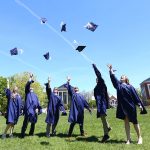The Washington Central School Board has selected a middle school principal from Connecticut to serve as its next superintendent. Bryan Olkowski was picked for the job.
Washington Central Picks New Superintendent
February 11, 2020
February 11, 2020
The Washington Central School Board has selected a middle school principal from Connecticut to serve as its next superintendent. Bryan Olkowski was picked for the job.
February 7, 2020
University of Connecticut assistant professor Stephen Slota encourages teachers to not only pick and glean from DMs, but from the wider design universe at large, whether video games, gardening or architecture. “Don’t reinvent the wheel,” said Slota. “If a design strategy exists and has been used in another realm but not yours, repurpose it – with appropriate attribution, of course. No one will worry that it’s been done before as long as the design works.”
February 5, 2020
SARA CARREIRA
WRITING / VOICE 01/31/2020 21:20 H
The great commitment of educational innovation in Galicia has a name: SEMGal, and it has been officially presented this Friday in Santiago with three exceptional witnesses, the creators of the theory on which the program is based and who have come from the University of Connecticut to train Galician teachers.
February 3, 2020
Glenn Mitoma, the director of the Thomas J. Dodd Research Center and an assistant professor with a joint appointment in the Human Rights Institute and the Neag School of Education, said UConn has done a particularly poor job of retaining faculty of color over the years.
January 31, 2020
EducationDive (Sally Reis and Joseph Renzulli mentioned)
January 31, 2020
How you interact, how you feel, and how you act: The three basic tenants of social, emotional, and behavioral health are simple concepts, yet they can be some of the strongest predictors of well-being as children grow into adulthood. While a large number of children and adolescents meet the diagnostic criteria for mental health disorders, only a fraction actually receive needed services – and it often takes a crisis situation to initiate access to that help.
Sandra Chafouleas, Board of Trustees Distinguished Professor in the Department of Educational Psychology at UConn’s Neag School of Education is the co-director of the UConn Collaboratory on School and Child Health (CSCH) and served as the project director and co-principal investigator of the National Exploration of Emotional/Behavioral Detection in School Screening, or NEEDS², project.

January 31, 2020
Neag School of Education Commencement Weekend will take place May 9-11, 2020.
January 30, 2020
When states choose to operate a program that involves public (or publicly governed) financing of private service providers, can the state choose to exclude religious providers?
January 24, 2020
When it comes to educating the most diverse student pool possible, University of Connecticut Civil and Environmental Engineering Department Head Maria Chrysochoou thinks the system might be broken.
Not broken in a sense that engineering students are going into the workforce unprepared, but broken in a way that doesn’t allow for a myriad of learning styles—especially ones aimed at a neurodiverse population.
January 24, 2020
How can today’s K-12 school districts ensure greater representation of low-income and minority students in gifted education programs? It’s important for educators to use and recognize the difference between two types of assessments to seek out students who can benefit from extended opportunities, resources and encouragement.